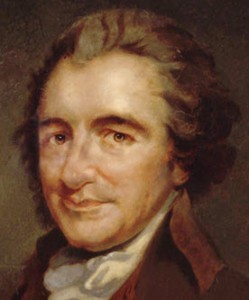
A citizen of Great Britain and an ardent revolutionary, Paine wrote daring and motivating pamphlets whose positive effects on American morale during the revolution were significant.
Seen as a true patriot and adoptive American he was viewed by many as a hero for his philosophical and morale-building contributions to the war effort. His revolutionary horizon was global.
Later, he made his way to Paris where he had already been named a member of the National Convention in absentia. Feted on his arrival by the revolutionaries of France his impolitic defense of the King soon cast him out to the edges of French republican national politics as Jacobin rule became more ruthless and entrenched. Arrested, and facing the guillotine he was saved by sheer luck with the overthrow of Robespierre. His inability to speak French did not dissuade him from serving in the National Convention.
Bitterly angry and disillusioned by his confinement in Paris, and feeling abandoned by his adopted country (the United States) Paine wrote a savage public personal attack against Washington. This was followed by a new pamphlet “Age of Reason” which criticized religion.
Having criticized his adoptive country’s greatest hero as well as its dominant religion his reputation in America was destroyed. Still supported by Jefferson, a fellow Utopian and dedicated revolutionary, Paine returned to the United States (courtesy of Jefferson). Paine considered France and the revolution there as lost.
Once a national hero in the United States and France, so negative was the public’s view of him that five only were in attendance at his funeral in 1809.